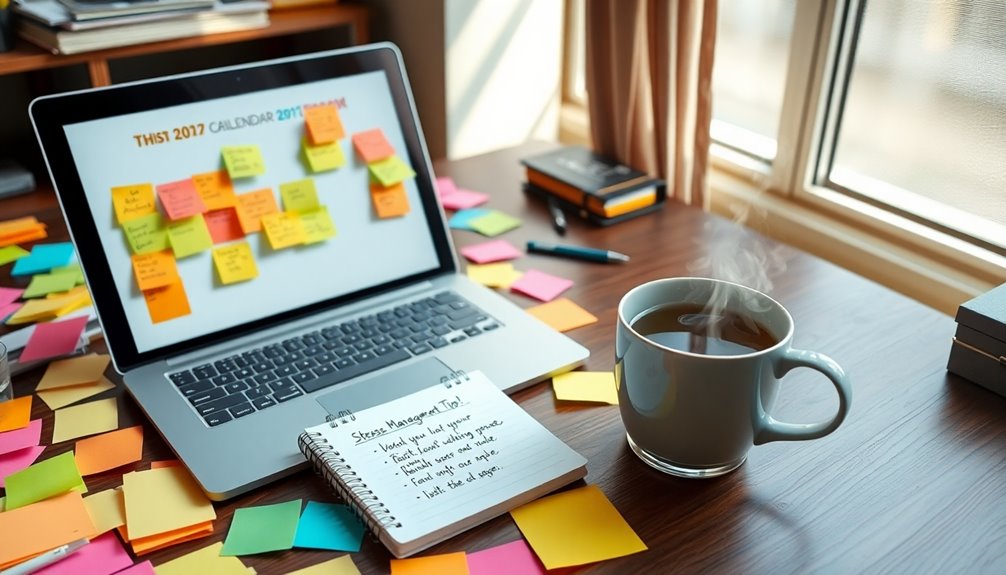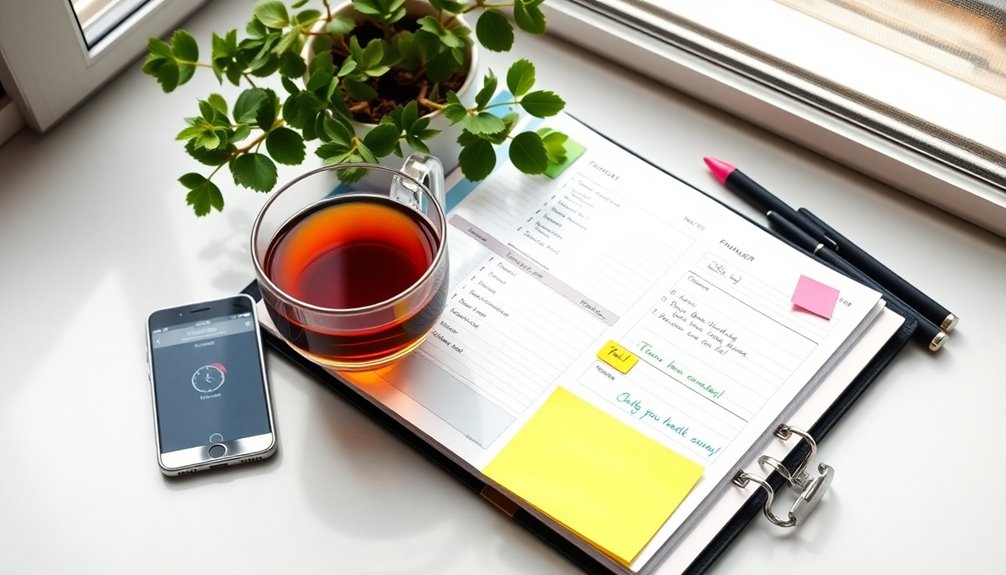If your schedule feels overwhelming, it's time to take control. Start by identifying your stress triggers and prioritizing your tasks, focusing on what's truly urgent. Set realistic goals to keep yourself motivated, and don't hesitate to learn to say no when demands pile up. Conduct a time audit to uncover time-wasters and create space for regular breaks—these refresh your mind and boost creativity. Utilize effective time management tools, and don't forget to seek support from friends or professionals. Reflect and adjust your strategies regularly for ongoing improvement. There's much more you can discover to help you reclaim your time.
Identify Your Stress Triggers
How well do you know what stresses you out? Identifying your stress triggers is essential for effective stress management.
Start by using stress identification techniques, like keeping a journal to track your feelings and situations that provoke anxiety. When you notice a pattern, reflect on it. Engage in emotional response analysis to understand how certain events impact your mood. Understanding your triggers can also help you develop self-awareness, allowing you to prepare for emotional situations more effectively. Recognizing your thought patterns can further enhance your ability to manage stress effectively.
Ask yourself why specific situations create stress and how you usually react. This insight not only helps you acknowledge your triggers but also empowers you to address them. Additionally, incorporating mindfulness practices can further aid in recognizing and managing your stress responses.
Prioritize Your Tasks
One effective way to manage stress is by prioritizing your tasks.
Start with task categorization to understand what's urgent versus important. Use deadline assessment to determine what needs your immediate attention.
Here's how you can effectively prioritize:
- List all your tasks
- Categorize them into urgent, important, and low-priority
- Assess deadlines for each task
- Focus on completing high-priority tasks first
- Regularly review your goals to ensure they remain relevant and aligned with your prioritization and goal setting strategies. Additionally, setting specific goals can enhance your proactive productivity and help you stay focused on what matters most. Developing time management techniques can further streamline your task completion and reduce stress levels.
Set Realistic Goals

After you've prioritized your tasks, the next step is to set realistic goals. Effective goal setting helps you focus your energy on what truly matters. Additionally, incorporating SMART framework principles into your planning can enhance the clarity and effectiveness of your objectives. Establishing specific, measurable goals is essential for maintaining motivation.
Break down your larger objectives into achievable milestones. By doing this, you create a clear roadmap that guides you through your tasks without feeling overwhelmed.
Start with short-term goals that are specific and measurable, then gradually work towards long-term aspirations. This approach not only boosts your motivation but also allows you to celebrate small victories along the way. Additionally, setting SMART goals ensures that your objectives are clear, trackable, and aligned with your overall career aspirations.
Remember, unrealistic expectations can lead to frustration, so be honest with yourself about what you can accomplish in a given timeframe.
With well-defined goals, you'll find it easier to manage your time and reduce stress.
Learn to Say No
Saying no can be one of the most powerful tools in your stress management toolkit.
When you practice boundaries setting, you reclaim your time and energy. It's essential to remember that healthy boundaries can significantly enhance your overall well-being. Establishing clear boundaries in communication helps prevent misunderstandings and reinforces your limits.
Here's how to say no effectively:
- Prioritize Your Commitments: Focus on what truly matters to you.
- Be Clear and Direct: Use assertive communication to express your limits.
- Avoid Guilt: Remember, it's okay to prioritize your well-being.
- Offer Alternatives: Suggest another time or person if possible.
- Practice Makes Perfect: The more you say no, the easier it becomes.
Recognizing your personal worth is vital in preventing feelings of guilt when declining requests. Embracing this autonomy in relationships fosters healthier dynamics and helps you maintain balance in your life.
Create a Time Audit

Creating a time audit can dramatically improve your stress management by helping you understand where your hours go.
Start by tracking your time for a week, noting how you spend each hour. This time tracking reveals patterns in your daily activities, highlighting tasks that consume more time than necessary. Additionally, implementing task prioritization can ensure that you're focusing on the most critical work. Engaging in mindfulness practices during your audit can also help you stay present and aware of how you're spending your time.
Once you've gathered this data, conduct a productivity analysis to identify areas for improvement. Are you spending too much time on low-priority tasks? Are distractions eating into your productive hours?
With this insight, you can prioritize essential activities and eliminate time-wasters. By regularly reviewing your time audit, you'll gain control over your schedule, ultimately reducing stress and enhancing your overall productivity. Additionally, regular assessments of your daily routines can lead to increased satisfaction and a more focused mindset.
It's a simple yet effective way to reclaim your time!
Implement a Daily Routine
Once you've completed your time audit, implementing a daily routine can further streamline your efforts to manage stress. A structured routine helps you feel more in control and reduces anxiety.
Start by incorporating morning rituals that set a positive tone for your day, like:
- Meditating or practicing gratitude
- Enjoying a healthy breakfast
- Taking a brisk walk
- Prioritizing your top three tasks
- Setting aside time for self-care
In the evening, establish an evening wind down to signal the end of your day. This can include:
- Reflecting on your accomplishments
- Reading or enjoying a hobby
- Preparing for tomorrow
- Disconnecting from screens
- Practicing relaxation techniques
With these routines in place, you'll find it easier to manage stress and reclaim your time.
Practice Mindfulness Techniques

While life can often feel overwhelming, practicing mindfulness techniques can help you stay grounded and present.
Start by incorporating mindful breathing into your daily routine. Take a few minutes to focus on your breath, inhaling deeply through your nose and exhaling slowly through your mouth. This simple act can center your thoughts and reduce stress.
Another effective technique is the body scan. Lie down comfortably and mentally scan your body from head to toe, noticing any tension or discomfort. By acknowledging these sensations without judgment, you create space for relaxation and awareness.
Engaging in these practices regularly not only enhances your focus but also allows you to navigate life's challenges with greater ease and clarity.
Take Regular Breaks
Taking regular breaks is essential for maintaining your focus and reducing stress.
You can use various techniques to guarantee your breaks are effective, and scheduling them strategically can make a big difference in your productivity.
Let's explore how to incorporate breaks into your routine for maximum benefit.
Importance of Breaks
How often do you pause during your busy day? Taking regular breaks is essential for maintaining focus and reducing stress. The break benefits are numerous, from boosting creativity to improving productivity.
Different break types can keep your mind fresh, so consider incorporating these into your routine:
- Short walks to clear your head
- Mindful breathing to center yourself
- Stretching exercises to relieve tension
- Quick snacks to fuel your body
- Social interactions to lighten your mood
Each of these break types offers unique advantages, allowing you to recharge effectively.
Techniques for Effective Breaks
Incorporating effective break techniques into your routine can greatly enhance your productivity and well-being. One simple method is to practice mindful breathing.
Take a few moments to focus on your breath, inhaling deeply through your nose and exhaling slowly through your mouth. This can help clear your mind and reduce stress.
Another great technique is to go for nature walks. Step outside, and immerse yourself in the sights and sounds around you. Nature has a remarkable ability to refresh your perspective and boost your mood.
Even a short walk can invigorate you, making you feel more focused when you return to your tasks.
Scheduling Breaks Strategically
While it might seem counterintuitive, scheduling breaks strategically can considerably enhance your overall productivity.
By incorporating break scheduling into your routine, you'll allow yourself to recharge and stay focused.
Here are some restorative activities to contemplate during your breaks:
- Take a quick walk outside to refresh your mind.
- Practice deep breathing or meditation for relaxation.
- Enjoy a healthy snack to fuel your body.
- Engage in a few stretches to relieve tension.
- Disconnect from screens to reduce eye strain.
Use Time Management Tools

Using time management tools can greatly reduce your stress levels.
Digital calendars and apps help you keep track of important dates, while task prioritization techniques guarantee you focus on what truly matters.
Time blocking strategies allow you to allocate specific periods for tasks, making your workflow more efficient and manageable.
Digital Calendars and Apps
Digital calendars and apps are powerful tools that can streamline your daily routine and reduce stress. By utilizing these digital organization tools, you can effectively manage your time and keep chaos at bay.
Here are some ways they can help:
- Use efficient scheduling apps for seamless planning.
- Leverage calendar synchronization techniques to stay updated across devices.
- Set reminders and notifications for important tasks and events.
- Take advantage of collaborative planning platforms for group projects.
- Consider time zone considerations to coordinate with remote teams.
Incorporating these strategies into your routine will enhance your productivity and give you more time to focus on what truly matters, all while minimizing the stress that comes with a packed schedule.
Task Prioritization Techniques
How can you effectively prioritize tasks to boost your efficiency and reduce stress? Start by distinguishing between urgent vs. important tasks.
Use the Eisenhower matrix to categorize your daily priorities, ensuring you focus on what truly matters. Implement task batching to group similar activities, which minimizes decision fatigue and enhances productivity.
Long-term planning is vital; align your goals with your daily tasks to maintain direction. Don't hesitate to use delegation strategies—sharing workload can lighten your burden and promote teamwork.
Balance your workload by setting realistic task deadlines and adjusting priorities as needed. Remember, effective task prioritization not only helps you meet deadlines but also paves the way for a more organized and less stressful life.
Time Blocking Strategies
When you embrace time blocking strategies, you can transform your approach to productivity and stress management. This method allows you to allocate specific chunks of time for different tasks, leading to numerous time blocking benefits.
Here are some effective time blocking examples to take into account:
- Morning routine: Set aside an hour for meditation and exercise.
- Deep work sessions: Block two hours for focused project work without distractions.
- Meetings: Schedule specific time slots for team check-ins and calls.
- Breaks: Include short breaks to recharge between tasks.
- Evening reviews: Dedicate time to reflect on accomplishments and plan for the next day.
Seek Support From Others
Although stress can often feel isolating, seeking support from others can make a significant difference in managing it. By tapping into your support networks, you can benefit from emotional assistance and peer accountability.
Engaging in collaborative efforts, whether through group activities or mentorship opportunities, helps you feel connected and understood. Don't hesitate to reach out for professional guidance when needed; therapists and coaches can provide valuable insights.
Additionally, explore community resources that offer programs designed to alleviate stress and promote well-being. Remember, you're not alone in your struggles, and sharing your experiences can lighten the load.
Reflect and Adjust Regularly

Building on the support you gain from others, regularly reflecting on your stressors and coping strategies can enhance your overall well-being.
Schedule self-assessment sessions to evaluate what's working and what's not. Create feedback loops by seeking input from trusted friends or colleagues.
Here are some effective ways to reflect and adjust:
- Journal your thoughts and feelings weekly
- Set aside time for quiet contemplation
- Discuss your experiences in group settings
- Identify patterns in your stressors
- Revise your coping strategies as needed
Conclusion
By identifying your stress triggers and prioritizing your tasks, you can reclaim control over your time. But don't stop there—what if saying no could open doors to new opportunities? Imagine the relief of taking regular breaks or the clarity a time audit brings. As you reflect and adjust, you'll discover a more balanced life waiting just around the corner. So, are you ready to take the first step toward a more manageable schedule? The choice is yours.



